UK CS:GO - Where has it gone? Richard Lewis, Brandon "weber" Weber and Jake "Jakem" McCausland share their views
We looked at the UK CS:GO scene and its recent decline by talking to prominent scene members and players.
This article was originally published on GameSpot's sister site onGamers.com, which was dedicated to esports coverage.
Throughout CS:S the scene from the United Kingdom was among the frontrunners in both experience and talent, with professional teams competing amongst the best in Europe and the rest of the world. At times UK players even branched out to other countries and teams to provide experience and skill that teams couldn't find in other countries such as Germany. However, now it seems that the entire influence of the UK on the rest of the world is gone. OnGamers spoke to several prominent members in the English scene to figure out why extactly.
Richard Lewis - CS:GO Caster, Analyst and long standing English-based eSports journalist:
As a continuous caster in the UK CS:GO scene, how do you see the recent activity of the scene? Does the bottleneck lie with the community or with the tournament infrastructure offered to the community?
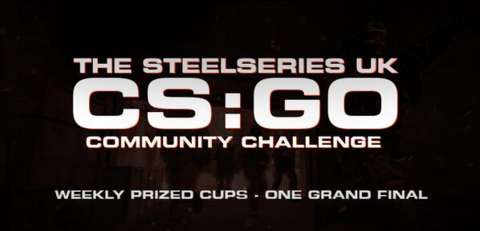
No player can say the events aren’t there. The I-series has seen dwindling returns on Counter-Strike, which used to be far and away their biggest tournament, despite continuing to support it. Players said it was “too expensive” and asked for alternatives. EPIC LAN tailored to that and find themselves struggling to get teams to turn out every event. I just commentated on their last event and it had 7 teams. While all this has been going on ESL UK has returned and continues to do great work but they are finding increasingly that other games are supporting their efforts in a better way also.
We were spoiled in the UK in a lot of ways. At least three big LAN events with European involvement for years, not to mention countless smaller events dotted around the country. Our LAN scene was at one point as good as anyone in Europe but it has dwindled away. I don’t know if this is a reflection of changing tastes within our gaming demographic but the appeal of Counter-Strike seems to have hugely altered in the last two or three years.
Are we at the lowest point UK CS has been in since the 1.6 times? Practically no teams play a role in the online qualifiers for the big events nor do we see UK talents branching out to international teams anymore?
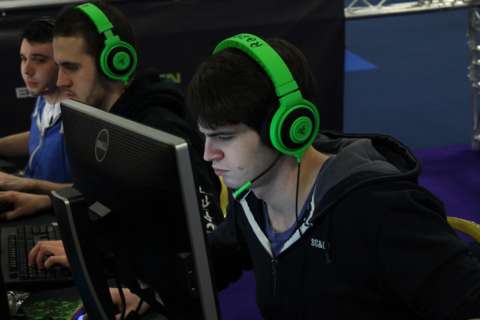
I don’t think there can be any doubt about that. We don’t have one recognised, stable team and the groups of players that are clustered round the few organisations that actually want to fund UK Counter-Strike, such as FM eSports and Reason Gaming, are no longer in a position to challenge the European elite. We’re in this pretty awful Catch 22 situation. The organisations that will fund UK CS need to see a return on that investment, which isn’t as simple as winning an I-series or EPIC LAN event any more. They need to be competing against the best teams for that exposure, which can only happen at larger events. To have any chance to get their the organisations recycle the old, experienced talent of days gone by. When that happens it is at the expense of giving that experience to developing players.
So, we end up with two groups – guys who had it, then lost it and aren’t inclined to work hard enough to get it back in the absence of a salary, and inexperienced players who we will never know if they are good enough or not because they are starved of opportunities to develop. Both ends of the spectrum aren’t adequate for the UK to get a real team together. There’s also the ongoing complaint of that, from an organisational perspective, there’s not a UK team worth paying a salary to but the players won’t put in the time required to get back to previous levels without the salary being offered, which is fair enough. In short, it’s all a bit of a mess.
Watching some/most of the games played out by UK's finest, what would you say is the biggest hold-back for UK teams to rise to international prominence?
It’s a complicated question to answer. The teams and players that genuinely have the potential don’t try. I don’t begrudge them that in a way because what are the rewards? Sponsorships for UK CS don’t really exist any more. You’re lucky as a UK team to even get sent to a LAN these days and that’s understandable because what is the return? As walking billboards go there are cheaper, smarter options and usually involvement with UK CS comes with headaches because in the absence of any road to go professional, there is also an absence of professionalism.
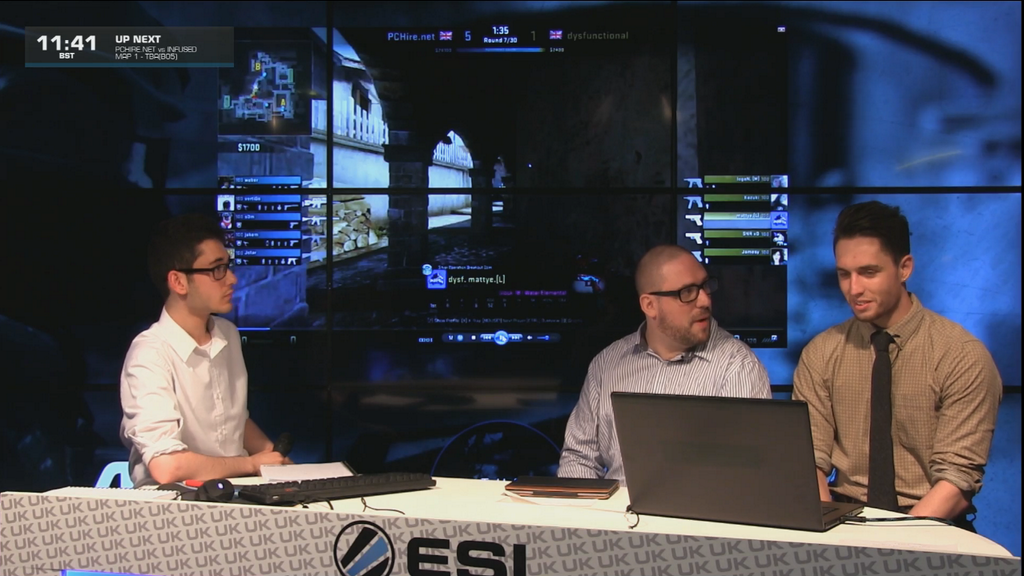
You can’t sit around and wait for pride to kick in either because the experienced players have nothing to prove. UK teams were at the top of CS:S when it started and reclaimed that crown when it ended thanks to the mousesports team. Other scenes had genuine 1.6 calibre to draw on when CS:GO came out. Ours didn’t. Finding the right blend of players to make successful teams seemed an impossible task and the UK slowly but surely slipped away. Do our best players think they have anything to prove? Of course not. They won countless events in their time, enjoyed salaries and have since gone on to lead real lives, graduate from universities, find employment. Their involvement now is always going to be about enjoyment, not competition.
So we turn to our less experienced players and what do we have? There may be some raw potential there but the attitude is so typically UK – they want instant results – that without the leadership of an older, wiser head, someone who understands the game and the industry, the teams are just constantly chopping and changing. That’s the real crazy part. Back when we had an abundance of good players, you could swap like for like and see some improvement. In the scene now you are just swapping out one guy who has some bad games, for another guy of similar skill and experience who is likely to go the same way. Rinse, repeat, fold. Stability is the only way any of these guys are going to have any chance of improving but who is there to protect them from their impatience? No one cares enough to do it.
Why does there seem to be a dichotomy between UK organizations letting the CS:GO scene dwindle, while tournament organizers are putting (small) extra attempts at sustainable support into the scene?
Organisations have a limited amount of money, reliant on sponsorship deals and partnerships for the most part, and the way they see a return of investment is through exposure and success. The two don’t always go hand in hand but a UK Counter-Strike team offers neither. That’s the brutal truth. As such only a smaller organisation for whom exposure is relative are going to make that investment.
Tournament organisers on the other hand make their money through attendance. IF there is a community out there that they know will turn up in force and pay to be at their events they will cater to them, regardless. When Counter-Strike was a front-runner in terms of event attendances other communities used to rally to beat them. It was a point of pride to say “we had more sign-ups.” Now beating Counter-Strike is the bare minimum you would expect to achieve. Established organisers will still cater to the UK community because they have a database full of people they know play that game and, if only for nostalgia’s sake, might come out of the woodwork to attend the event. If a new tournament organiser came along to the UK and only wanted to tailor to UK players chances are they would focus on console. That’s something to also state here – it’s not just Counter-Strike suffering in UK e-sports, it is across the board. Counter-Strike is the most noticeable because it truly is a fallen giant.
Brandon "weber" Weber - ex-player of mTw, FM!Toxic and Dignitas amongst others:
The question gets asked time and time again, but there seems to be little new talent seeping through the cracks.. Who are the hopefuls according to you and what needs to happen to bring them to the point where they put the UK back on the international CS map?
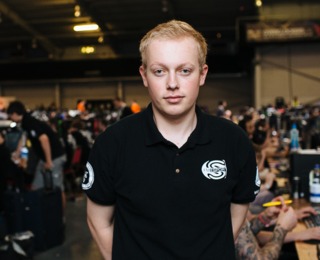
There are many players such as Jstar, puls3, Vertigo, reazn and a few others that really have what it takes to put UK CS on the map in my honest opinion. I think the issue we have in the UK scene is that every single player is developed in a gather system and that really puts on hold the tactical side of the game and focuses majorly on aim.
We have an abundance of natural aimers in the scene but what really hinders them is that they all seem to think you can get by alone with out-aiming players and that simply doesn't work when the going gets tough in high pressure matches. I think players need to start focusing on learning the tactical side of the game and really just soak up every single piece of advice they receive from more experienced players, only then will we finally put up a fight in the UK scene.
Although previously UK players, including yourself in mTw at one point, were branching out to foreign teams, now it seems other players are coming to the UK to strengthen the scene (Lithuanian and Estonian players come to mind), is this necessary and what do you feel is the impact of this?
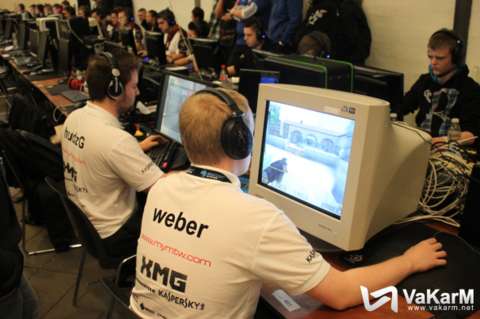
I don't necessarily mind foreign players coming into the UK scene as it gets certain players that may not be individually strong enough alone a chance to shine alongside some not so unknown foreign players. If you take a look at United Estonia for example, they have 2/3 Estonian players that are active in the EU scene and they've added 2/3 UK players that really don't have a name for themselves in even the mid tier UK scene and they've played toe to toe with the best the UK have to offer, albeit online.
There have been a few negative comments placed by UK players about this happening but if you take away the heat of the game any player will admit that the growth is good and we should welcome players into the scene.
It's no secret that organizations that previously housed UK squads have been less willing to do so currently. Are they right to branch out? What needs to happen to gain back their interest?
No UK team really warrants support on an international level so it's understandable they want to branch out to European lineups as it obviously gains them more exposure when said team wins or performs well at LAN events. At the end of the day organisations need to impress their sponsors and no real UK team as it currently stands can do that so you'll see no arguments from me on that point.
To get UK organisations back into sponsoring UK teams they need to have a team built of 5 players all on the same page, you can't have teams changing players after every single LAN because no organisation wants to have an unstable team.
You personally held some international relevance earlier in CS:GO but seem to have dwindled to just the UK scene, the same goes for the likes of NeiL, Puls3 et cetera. What has happened to the entire front-line of UK CS that even this last point of influence has fallen through at the same time despite CS:GO continuing to pick up steam?
To refer to my previous answer I just think no team can hold a stable lineup and that is whats hindering the UK CS:GO scene right now. If you could get 5 players that all enjoy doing what they do, enjoy playing with each other, all having the correct mindset and to top that off no interest in changing players after a sub-par performance you might finally get a team that will break into the upper echelons of CS. A team that is willing to lose and fix their mistakes is something I personally believe has been missing for the whole of CS:GO in the UK scene and hopefully in the near future a team will form that is willing to do that.
Jake "jakem" McCausland - longstanding member of the Rasta Community and ex-player of Reason Gaming, Rasta.Xd and current player of FM!Toxic:
Rasta is one of the few remaining teams that has stuck by the UK scene despite its recent decay. How does the organization look at the CS scene nowadays and has the situation changed within the organization from what it was before?
Rasta is still very much alive and booming and has recently taken up new management in the form of Stephen “Steptoe” Allison. Blanks the former manager invests most of his time in Reason now so with Steptoe in charge Rasta is still very much a supporter of UKCS and is going to continue to grow.

What do you feel about the likes of Reason, Dignitas et cetera letting go of their UK professional teams? Are they right to do so and what needs to happen to gain their attention back?
One thing the UK desperately needs is stability and these organisations gave their former teams plenty of chances to create line-ups but I think it is a good move on their behalf to move to European teams who take the game more seriously and act more professional. The only way the UK is going to progress is if a team can stick together for more than a month and then maybe the top organisations would consider investing back into the UK scene.
There seems to be a problem in the scene internally as well. Is there an infrastructure in place to support potential talent in the UK or does the problem lie elsewhere? Where?
There are many problems within the UK; the potential talent problem isn’t really an issue its more the attitude of these up and coming players who expect to being giving a chance with no reason or meaning. A typical scenario would be a new UK team getting released and someone saying same old UK players recycled. However not many people put themselves forward or attend LANs anymore in the UK so I don’t understand how people are expected to be “scouted”. There are always a few up and comings who get through the cracks but there is also a lot of luck involved too.
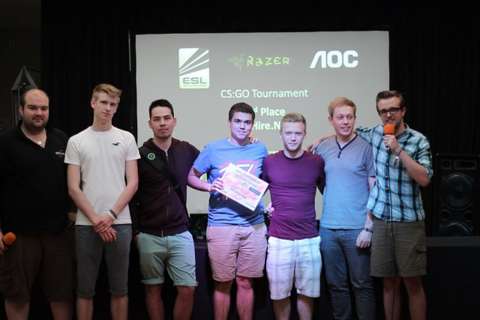
The biggest problem in the UK scene has been the same from the start of CSGO, as it’s a new game everybody wants to be seen as the best UK team. This means lots of people will go out of their way to ruin other teams and also nobody supports any other UK team in the scene. Whereas in source the hierarchy of teams were already in place for a long time and you always support your fellow UK teams against any euro team. Now it’s more I hope those guys get 16-0d.
You personally held some international relevance earlier in CS:GO but seem to have dwindled to just the UK scene, the same goes for the likes of NeiL, Puls3 et cetera. What has happened to the entire front-line of UK CS that even this last point of influence has fallen through at the same time despite CS:GO continuing to pick up steam?
For me personally I got bored of creating teams and wanting to be keen as there wasn’t 5 players in the UK you could trust and a lot of the players had really bad attitudes and would look to swap and change line-ups constantly which is not the way to get good. The problem isn’t with the skill of the players but more so the attitude, I’d like to be proved wrong but I can see there being more line-up changes swooping across the UK scene again within a couple weeks due to playing bad against teams they aren’t actually supposed to beat. All the UK needs is stability and find 5 players who all get on and you don’t have to be looking over your shoulder constantly to whether or not you’re going to be replaced.
Make sure to follow the interviewees at:
Richard Lewis: Twitter & Facebook
Brandon "weber" Weber: Facebook & Twitch Stream
Jake "jakem" McCausland: fm-eSports
picture credits: Razerzone.com, Henry Greer, ESL, FM-eSports, Vakarm, Rasta Gaming and EpicLan
Got a news tip or want to contact us directly? Email news@gamespot.com
Join the conversation